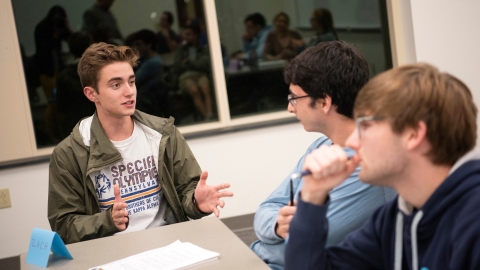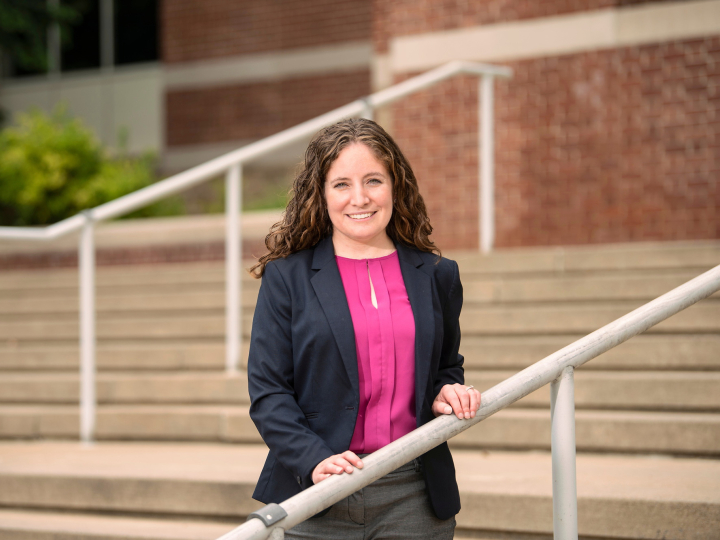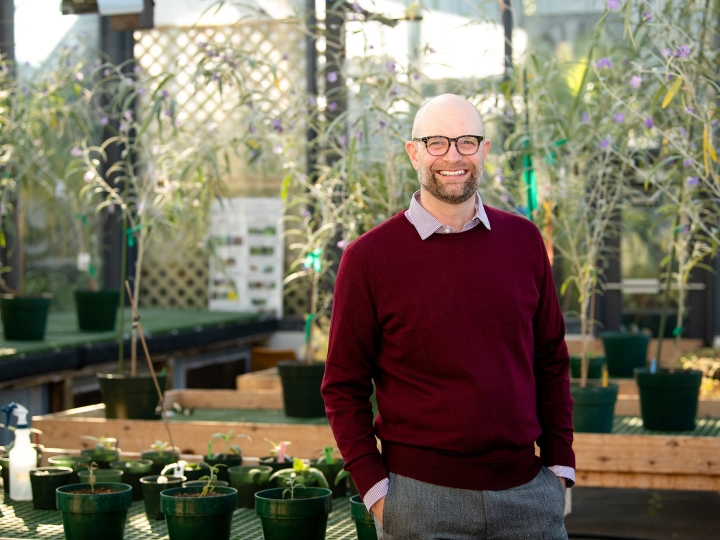
Undergraduate Researchers Help Shape Bucknell Philosophy Course
December 3, 2018
Conor Moore '20 leads a small-group discussion in Science in the Public Eye, a new philosophy course designed with input from undergraduate researchers. Photo by Emily Paine, Communications
Conor Moore '20 was the kind of high school student who read environmental science articles for fun, so majoring in environmental studies at Bucknell was a natural choice. What he couldn't have predicted was the first-year philosophy course that inspired him to add a second major in that discipline — or the opportunity to help shape a new class that marries his two interests.
Find Your Path
Learn more about applying to Bucknell
Moore is one of four student research assistants who teamed with Professor Matthew Slater, philosophy, to develop Science in the Public Eye, which explores public perceptions and trust of science. Blending the humanities and social sciences, it offers an interdisciplinary opportunity for students to conduct original research in three categories — science communication, science education and scientific practice. The goal is to illuminate the relationship between public understanding of the scientific enterprise and public opinion of science-related topics.
"No one has really done the social science research to gauge widespread understanding of science as a process," Slater said. "We're in this as a collective endeavor to try to contribute some new information and new knowledge to the world. I find that exciting, and because it involves current events, I think students do, too."
Moore, a Posse scholar who grew up in Turkey and Washington, D.C., offered an example of the ideas explored in class. "If you understand science, you should be more accepting that climate change is a threat," he said. "But research shows the exact opposite to be true, which means we're not understanding scientific literacy well. There's a communication problem, and the challenge is to figure out how we can mend it."
An Active Role for Students
Slater created Science in the Public Eye as part of the Production of Public Understanding of Science (PoPUS) Project, a collaborative research effort he formed in 2014 with fellow philosophy professor Jason Leddington. He prioritizes student involvement — eight undergraduates have been listed as co-authors on PoPUS papers — and the new course provides another way to bring them into his research.
Planning began last summer, when Slater hired four student researchers with funding from the Humanities Center's Summer Teaching Lab. Moore, along with Paige Braun '20, Kendall Cowie '19 and Natalie Minella '20, joined Slater to review current research and map out a structure for the class. While Minella, a sociology major, was studying abroad this semester, the other three students continued on to serve as teaching assistants for the course.
"Meeting twice a week with Professor Slater and the other assistants, bouncing ideas off each other and paving our own path to figure out where to go next was a great experience," Moore said. "That's the kind of research that gets me really excited. It's how I like to approach learning, rather than following a very settled and strict set of tasks."
Braun, a Presidential Fellow from Philadelphia who majors in philosophy, political science and economics, was intrigued by the opportunity to explore the connection of philosophy and science through teaching her classmates. "Learning something yourself and then helping others understand it makes you really absorb the material," she said.
Doing 'Good Science'
To gather data for their research, class members developed survey questions to ask friends and family over fall break. They then coded and analyzed responses in preparation for final presentations. Their findings were also incorporated into research Slater co-presented at a recent Philosophy of Science Association conference. "We were only able to present our conclusions — which surprised many people — because of the efforts of Science in the Public Eye students," he said.
Slater, who received a $210,000 National Science Foundation Scholars Award to work on a PoPUS-related book project this year, led the students through a mock grant-funding process that required them to justify their research. "I want to make sure they're thinking like scientists," he explained. "They need to look at considerations such as, is this a question that's already been studied? Is there enough existing data to answer the question? If not, what would it cost to get it? I want them to do good science."
Students said the class has given them valuable perspective. Colleen Buckley '19, an animal behavior major from River Edge, N.J., gained a sharper appreciation of the importance of communication in her field, particularly through her classroom conversations with non-science majors.
"Very little can be achieved if scientists do not convey their knowledge appropriately," she said. "As I prepare to enter the working world, I'm excited to take with me a better sense of how to ensure the public understands scientific information, which has major implications for research and conservation."
For Cowie, who majors in biology and classics & ancient Mediterranean studies, assisting with the course strengthened her ability to be a voice for science in everyday life. "Philosophically and personally, I am now able to help others become more scientifically literate because I've gained so much understanding of the related issues," said the Clinton, N.J., resident. "I'm hoping I can be a better advocate for science, especially in this political climate."

